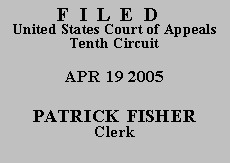

| UNITED STATES OF AMERICA,
Plaintiff-Appellee,
v.
LEROY HAYNES Defendant-Appellant. |
No. 04-1337
(D.C. No. 03-CR-561-RB) (Colorado) |
Anders holds that if counsel finds a case to be wholly frivolous after conscientious examination, he may so advise the court and request permission to withdraw. Counsel must also submit to both the court and his client a brief referring to anything in the record arguably supportive of the appeal. The client may then raise any point he chooses, and the court thereafter undertakes a complete examination of all proceedings and decides whether the appeal is in fact frivolous. If it so finds, it may grant counsel's request to withdraw and dismiss the appeal. Id. at 744. Pursuant to Anders, counsel has provided Mr. Haynes with a copy of his appellate brief and Mr. Haynes was given an opportunity to respond, which he did by filing a pro se reply brief raising two issues.
Mr. Haynes first complains that he was denied his Sixth Amendment right to effective assistance of counsel. This court has repeatedly stated that ineffective assistance of trial counsel claims should be brought in collateral proceedings, not on direct appeal. United States v. Galloway, 56 F.3d 1239, 1240 (10th Cir. 1995). "Such claims brought on direct appeal are presumptively dismissible, and virtually all will be dismissed." Id.; see also United States v. Coleman, 9 F.3d 1480, 1487 (10th Cir. 1993). Mr. Haynes has failed to show that his claim qualifies as one of those "rare instances" in which we should hear an ineffective counsel challenge on direct review. Galloway, 56 F.3d at 1240.
Mr. Haynes next contends that his sentence was imposed in violation of Blakely v. Washington, 124 S. Ct. 2531 (2004). In Blakely, the Supreme Court applied the rule it expressed in Apprendi v. New Jersey, 530 U.S. 466 (2000), to Washington state's determinate sentencing regime. See 124 S. Ct. at 2536. Recently, the Court applied the rule of Apprendi and Blakely to the Federal Sentencing Guidelines, holding that the Sixth Amendment requires "[a]ny fact (other than a prior conviction) which is necessary to support a sentence exceeding the maximum authorized by the facts established by a plea of guilty or a jury verdict must be admitted by the defendant or proved to a jury beyond a reasonable doubt." United States v. Booker, 125 S. Ct. 738, 756 (2005). To remedy the guidelines' Sixth Amendment problem, the Court severed and excised 18 U.S.C. § 3553(b)(1), invalidating their mandatory application. Id. at 756-57, 765. As a result, the guidelines are now advisory in all cases. Id. at 757. In addition, the Court expressly stated that its "remedial interpretation of the Sentencing Act" must be applied "to all cases on direct review." Id. at 769. In determining Mr. Haynes' sentence, the district court did not rely upon judge-found facts, but it did apply the then-mandatory federal sentencing guidelines. We must therefore evaluate Mr. Haynes' sentence in light of the Booker remedy.
Because Mr. Haynes raised Blakely in the district court, he properly preserved his non-constitutional Booker claim and we review it for harmless error. See United States v. Labastida-Segura, 396 F.3d 1140, 1142 (10th Cir. 2005). According to Federal Rule of Criminal Procedure 52(a), "[a]ny error, defect, irregularity, or variance that does not affect substantial rights must be disregarded" on harmless error review. Fed. R. Crim. P. 52(a). In the instant case, the district court sentenced Mr. Haynes under sentencing guidelines it viewed as mandatory. The court also exercised its discretion to sentence Mr. Haynes at the bottom of his applicable guidelines range. We have held that where non-constitutional Booker error was properly preserved and the defendant was sentenced at the bottom of his guidelines range, we cannot conclude the error was harmless:
Here, where it was already at the bottom of the guidelines range, to say that the district court would have imposed the same sentence given the new legal landscape (even after consulting the Sentencing Guidelines in an advisory capacity) places us in the zone of speculation and conjecture--we simply do not know what the district court would have done after hearing from the parties. Though an appellate court may judge whether a district court exercised its discretion (and whether it abused that discretion), it cannot exercise the district court's discretion.
Labastida-Segura, 396 F.3d at 1143 (citation omitted). Similarly here, we cannot say that Mr. Haynes' non-constitutional Booker error did not affect the district court's selection of the sentence imposed. As a result, we DENY counsel's motion to withdraw and REMAND the case to the district court for resentencing consistent with this opinion.
ENTERED FOR THE COURT
Stephanie K. Seymour
Circuit Judge
*.After examining appellant's brief and the appellate record, this panel has determined unanimously that oral argument would not materially assist the determination of this appeal. See Fed. R. App. P. 34(a)(2) and 10th Cir. R. 34.1(G). The case is therefore submitted without oral argument. This order and judgment is not binding precedent, except under the doctrines of law of the case, res judicata, or collateral estoppel. The court generally disfavors the citation of orders and judgments; nevertheless, an order and judgment may be cited under the terms and conditions of 10th Cir. R. 36.3.
1.Mr. Haynes' conviction resulted in a base offense level of six. Pursuant to the jury's finding beyond a reasonable doubt that Mr. Haynes' actions involved an intended loss amount of $79,800, the district court increased his base offense level by six levels, resulting in a total offense level of twelve. Rec., vol. VI, at 28.